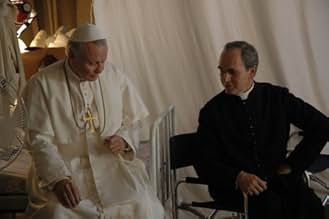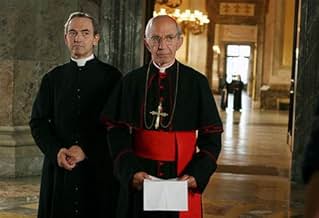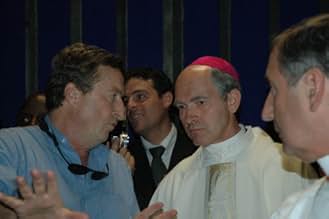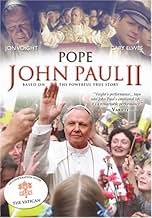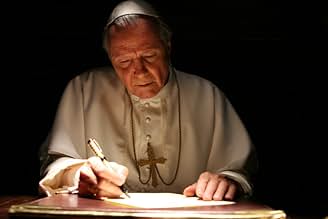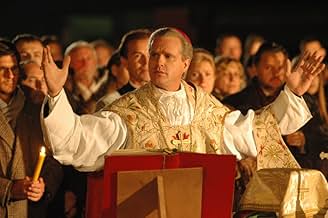AVALIAÇÃO DA IMDb
6,7/10
1,3 mil
SUA AVALIAÇÃO
Adicionar um enredo no seu idiomaRaised by his father in Krakow after his mother's death, student Karol Wojtyla abandons his youthful dreams of acting at the beginning of World War II, secretly defying Nazi oppression in hi... Ler tudoRaised by his father in Krakow after his mother's death, student Karol Wojtyla abandons his youthful dreams of acting at the beginning of World War II, secretly defying Nazi oppression in his homeland.Raised by his father in Krakow after his mother's death, student Karol Wojtyla abandons his youthful dreams of acting at the beginning of World War II, secretly defying Nazi oppression in his homeland.
- Indicado para 1 Primetime Emmy
- 3 indicações no total
Explorar episódios
Avaliações em destaque
Fascinating recounting of the Pope Juan Pablo II , Karol Wojtyla , his early life (1939-78 period) well played by Gary Elwes , and subsequent epoch magnificently acted by John Voight . The film concerns about the majestic figure , the Polish Pope Karol Wojtyla (John Voight , though Ian Holm was originally cast for the role but left for personal reasons) brought to the life at much expense and with sense and thought since his youth in Poland ,the early years , until his appointment as Pope of the Catholic church in Rome(1978). The movie starts on October 12,1939 when the evil men Nazis get taken the world , Nazis have invaded Poland , they've destroyed the Polish air force, 500 plane pulverised before they could take off , bombed cities , radio station , Churchs... Meanwhile Karol lives with his father but he wants to join the Army . He hides but the Nazis as well as the Russians have invaded the border . Hitler and Stalin made a pact ,the Red army has betrayed to Poland and now they don't take prisoners . Hitler appointed Hans Frank chief civilian officer for occupied Polish territory and then Governor-General of occupied Poland . Hans Frank described his policy in this post : ¨Poland shall be treated like a colony:the Poles will become the slaves of the Greater German Empire¨ . He destroyed Poland as a national entity and exploited its human and material resources for the German war effort . Frank ran Poland in imitation of the Nazi state.He ordered the killing of Polish Intelligence and Military officials in an attack of destruction and hatred against the Polish universities and the Catholic Church . He warned that Jews and Poles could be sentenced to death for any act of force against the German or for damage to a public installation , he confiscated Jewish and Polish property , he expropriated valuable paintings for his own house and he allowed huge quantities of food to be smuggled from Poland to Germany . By December 1942 more than 95 percent of the Jews in Poland had been transported to extermination camps . The future Pope must to confront these adversities and misfortunes,he suffers cruel experiences but the God's faith and the love is the cure for the badness . Then he assisted the holiness call and goes into the seminar and as priest he serves his first mass . After he's appointed bishop and Cardinal and continuing consoling the mankind . Later was elected Pope , the first no Italian from 1523. His second period dealt his fruitful pontiff (1978-2005) and the pastoral journeys he made to America , Mexico and many others countries, making an intense diplomatic labour and problems that were taking place in the Catholic church ,including the 1981 attack by Ali Agca . Thanks to his unshakable tenacity , Pope John Paul II helps to change the course of history : liberty in Poland helped by Lech Walesa and the fall of the Berlin Wall in 1989 decrees the collapse of Communism . But the Pope does not stop being the voice of Christ, even among the injustices of the capitalistic Western world , even among the provocations and challenges of modern times , as developing the faith to inspire millions begins with the power of one .
The film captures splendidly the goodness and generosity of the immortal Pope . Cary Elwes as well as John Voight give fine acting portraying accurately the unforgettable Pope renovating the moral sense and thoughts , giving hope , fighting for human rights and winning the hearts of the people . Footage of the real Pope John Paul II , albeit with his face obscured , was used for a few scenes, most notably the televised meeting with foreign people and US President Ronald Reagan . The film was approved by the late Pope John Paul II. The project started before his death, and Pope John Paul II was very hands-on with the production and knew of the script ; also , Pope Benedict XVI praised the film after watching a screening on November 2005. The motion picture is magnificently played by an excellent plethora of support actors such as James Cromwell as Cardinal Adam Sapieha , Christopher Lee as Cardinal Stefan Wyszynski , Ben Gazzara as Cardinal Agostino Casaroli ,Vittoria Belvedere as Eva and the recently deceased Giuliano Gemma as Navarro Valls . Furthermore , Daniele Pecci as Roman , whose role is based on Jerzy Kluger, a Polish Jew and lifelong friend of Wojtyla . There also appears Pope Benedict XVI, he is briefly depicted in the film as Cardinal Joseph Ratzinger played by Mikolaj Grabowski . Special mention to touching , evocative musical score by Marco Frisina , he is also a Roman Catholic priest and director of the Pastoral Worship Center at the Vatican . The picture was rightly directed by John Kent Harrison . This film's release smashed box office records in Pope John Paul II's native Poland.
Other films about this majestic figure are the followings : ¨Karol , the Pope , the Man¨ (2006) by Giacomo Battiato with Piotr Adamczyk as John Paul II , Michele Placido , Daniela Giordano and Leslie Hope ; ¨Have No Fear : The Life of Pope John Paul II¨ (2005) (TV) by Jeff Bleckner with Thomas Kretschmann as Pope John Paul II , Joaquim de Almeida as Salvadoran Archbishop Oscar Romero and Bruno Ganz as Cardinal Stefan Wyszynski "Karol: A Man Who Became Pope" (2005) with Piotr Adamczyk as Karol Wojtyla , Ken Duken as Adam Zielinski , Raoul Bova , Kenneth Welsh and Violante Placido , ¨Pope Juan Pablo II¨ by Herbert Wise with Albert Finney and Brian Cox , and ¨From a Far Country¨ (1981) by Zanussi with Sam Neill , Christopher Cazenove , Lisa Harrow and Daniel Olbrychski .
The film captures splendidly the goodness and generosity of the immortal Pope . Cary Elwes as well as John Voight give fine acting portraying accurately the unforgettable Pope renovating the moral sense and thoughts , giving hope , fighting for human rights and winning the hearts of the people . Footage of the real Pope John Paul II , albeit with his face obscured , was used for a few scenes, most notably the televised meeting with foreign people and US President Ronald Reagan . The film was approved by the late Pope John Paul II. The project started before his death, and Pope John Paul II was very hands-on with the production and knew of the script ; also , Pope Benedict XVI praised the film after watching a screening on November 2005. The motion picture is magnificently played by an excellent plethora of support actors such as James Cromwell as Cardinal Adam Sapieha , Christopher Lee as Cardinal Stefan Wyszynski , Ben Gazzara as Cardinal Agostino Casaroli ,Vittoria Belvedere as Eva and the recently deceased Giuliano Gemma as Navarro Valls . Furthermore , Daniele Pecci as Roman , whose role is based on Jerzy Kluger, a Polish Jew and lifelong friend of Wojtyla . There also appears Pope Benedict XVI, he is briefly depicted in the film as Cardinal Joseph Ratzinger played by Mikolaj Grabowski . Special mention to touching , evocative musical score by Marco Frisina , he is also a Roman Catholic priest and director of the Pastoral Worship Center at the Vatican . The picture was rightly directed by John Kent Harrison . This film's release smashed box office records in Pope John Paul II's native Poland.
Other films about this majestic figure are the followings : ¨Karol , the Pope , the Man¨ (2006) by Giacomo Battiato with Piotr Adamczyk as John Paul II , Michele Placido , Daniela Giordano and Leslie Hope ; ¨Have No Fear : The Life of Pope John Paul II¨ (2005) (TV) by Jeff Bleckner with Thomas Kretschmann as Pope John Paul II , Joaquim de Almeida as Salvadoran Archbishop Oscar Romero and Bruno Ganz as Cardinal Stefan Wyszynski "Karol: A Man Who Became Pope" (2005) with Piotr Adamczyk as Karol Wojtyla , Ken Duken as Adam Zielinski , Raoul Bova , Kenneth Welsh and Violante Placido , ¨Pope Juan Pablo II¨ by Herbert Wise with Albert Finney and Brian Cox , and ¨From a Far Country¨ (1981) by Zanussi with Sam Neill , Christopher Cazenove , Lisa Harrow and Daniel Olbrychski .
Folks, last night I watched the second and last part of CBS's biopic on Pope John Paul the Great, and as far as I'm concerned, of the three papal biopics I've seen this year, this one is the best, and the most faithful to the late Pope's life.
So far, this is the only biopic that has respected the order of events in Pope John Paul's life. There was good attention to detail: the conclave scene is faithful down in terms of place and ceremony. You may clearly see the cardinals' seats in the Sistine Chapel, as well as the three-cardinal committee that counted the ballots, everything, including the cry of "extra omnes" ("everyone out") preceding the start of the election, was authentic. The ABC's biopic that aired last Thursday rendition of the same moment seemed oversimplified and rushed in comparison.
The real strength of the movie lies in its cast. Cary Elwes played the younger Karol Wojtyla in the movie's first part and I have to say that at times, and from certain angles, he closely resembled the young Wojtyla. But the thing I liked the most is that he projected an *inner joy* and peace that was captivating. Wojtyla was no sourpuss and Elwes "got it right." The only thing that appeared inauthentic is that when he portrayed the late pope's quarry days during the Nazi occupation, he too seemed chubby and well-fed as compared to pictures Wojtyla in pictures taken at the time. The Nazi diet in Poland was not the best fare and it showed in Wojtyla even on his first photos as a priest. Apparently, Elwes hesitated to go into a drastic diet to change his looks so drastically for this role. I can't say I blame him.
For John Voight, this was an Emmy-worthy performance. It helped that Voight resembled the Pope physically, sharing the same square, strong jaw as John Paul. The way Voight captured Pope John Paul's accent and baritone voice was at times pretty scary, so much so that I wonder how much of his lines were lip-synced to existing audio tracks of the late Pope. Voight's countenance when he opened the Holy Doors for the Year 2000 Jubilee so uncannily resembled John Paul's that I had to blink a couple of times to ensure that I was watching Voight and not John Paul. Therefore, kudos and congrats go too to CBS's makeup department for such an outstanding job. Maybe there's an Emmy here for them too.
Voight captured John Paul's physical suffering so much so that it was inspiring. I bet that is not easy to capture a face paralyzed by Parkinson's disease, but Voight did it, down to the trickle of saliva off the side of his mouth at the reenactment of the Pope's last public appearance.
Secondary characters: James Cromwell played Cardinal Adam Sapieha, Wojtyla's first mentor and Archbishop of Krakow during WWII. You might remember from roles as the robot developer and inventor in _I, Robot_ and as the warp drive inventor, Zefram Cochrane in _Star Trek: First Contact_. He did well in this movie.
Christopher Lee played Cardinal Stefan Wyszynski of Warsaw, Wojtyla's other mentor. You may remember that Lee played Count Doku in the last two episodes of the _Star Wars_ prequel. That was weird I feel bad that I've type-casted poor Christopher Lee into a bad guy role for ever and ever.
I also applaud the portrayal of the Pope's "nephews and nieces," his inner circle of friends and spiritual children, from whom Wojtyla learned so much about the human condition. His friendship with "Roman," a Jewish childhood friend was endearing and illustrative of Pope John Paul's big heartalthough I have to say that I don't remember "Roman" from any of the bios I've read about John Paul. Maybe "Roman" is a composite character. The name of the Pope's childhood Jewish friend was different in the other two biopics. That leads me to believe that's probably the case.
One bad point: the scene where the Pope was in his open pope mobile cruising St. Peter's Plaza, with the columnata in the background, and the crowd in front of him, on his way to be shot by Mehmet Ali Agca looked fake through and through. The three "layers" were superimposed and they sort of "shook" out of sync with normal movement. It may me dizzy to look at it. Thumbs down to the special effects people.
All-in-all, it was a great production. As soon as I'm able, I'll get me the DVD.
So far, this is the only biopic that has respected the order of events in Pope John Paul's life. There was good attention to detail: the conclave scene is faithful down in terms of place and ceremony. You may clearly see the cardinals' seats in the Sistine Chapel, as well as the three-cardinal committee that counted the ballots, everything, including the cry of "extra omnes" ("everyone out") preceding the start of the election, was authentic. The ABC's biopic that aired last Thursday rendition of the same moment seemed oversimplified and rushed in comparison.
The real strength of the movie lies in its cast. Cary Elwes played the younger Karol Wojtyla in the movie's first part and I have to say that at times, and from certain angles, he closely resembled the young Wojtyla. But the thing I liked the most is that he projected an *inner joy* and peace that was captivating. Wojtyla was no sourpuss and Elwes "got it right." The only thing that appeared inauthentic is that when he portrayed the late pope's quarry days during the Nazi occupation, he too seemed chubby and well-fed as compared to pictures Wojtyla in pictures taken at the time. The Nazi diet in Poland was not the best fare and it showed in Wojtyla even on his first photos as a priest. Apparently, Elwes hesitated to go into a drastic diet to change his looks so drastically for this role. I can't say I blame him.
For John Voight, this was an Emmy-worthy performance. It helped that Voight resembled the Pope physically, sharing the same square, strong jaw as John Paul. The way Voight captured Pope John Paul's accent and baritone voice was at times pretty scary, so much so that I wonder how much of his lines were lip-synced to existing audio tracks of the late Pope. Voight's countenance when he opened the Holy Doors for the Year 2000 Jubilee so uncannily resembled John Paul's that I had to blink a couple of times to ensure that I was watching Voight and not John Paul. Therefore, kudos and congrats go too to CBS's makeup department for such an outstanding job. Maybe there's an Emmy here for them too.
Voight captured John Paul's physical suffering so much so that it was inspiring. I bet that is not easy to capture a face paralyzed by Parkinson's disease, but Voight did it, down to the trickle of saliva off the side of his mouth at the reenactment of the Pope's last public appearance.
Secondary characters: James Cromwell played Cardinal Adam Sapieha, Wojtyla's first mentor and Archbishop of Krakow during WWII. You might remember from roles as the robot developer and inventor in _I, Robot_ and as the warp drive inventor, Zefram Cochrane in _Star Trek: First Contact_. He did well in this movie.
Christopher Lee played Cardinal Stefan Wyszynski of Warsaw, Wojtyla's other mentor. You may remember that Lee played Count Doku in the last two episodes of the _Star Wars_ prequel. That was weird I feel bad that I've type-casted poor Christopher Lee into a bad guy role for ever and ever.
I also applaud the portrayal of the Pope's "nephews and nieces," his inner circle of friends and spiritual children, from whom Wojtyla learned so much about the human condition. His friendship with "Roman," a Jewish childhood friend was endearing and illustrative of Pope John Paul's big heartalthough I have to say that I don't remember "Roman" from any of the bios I've read about John Paul. Maybe "Roman" is a composite character. The name of the Pope's childhood Jewish friend was different in the other two biopics. That leads me to believe that's probably the case.
One bad point: the scene where the Pope was in his open pope mobile cruising St. Peter's Plaza, with the columnata in the background, and the crowd in front of him, on his way to be shot by Mehmet Ali Agca looked fake through and through. The three "layers" were superimposed and they sort of "shook" out of sync with normal movement. It may me dizzy to look at it. Thumbs down to the special effects people.
All-in-all, it was a great production. As soon as I'm able, I'll get me the DVD.
The first half of this TV movie, "Pope John Paul II", was shown on Sunday last. The second part was shown tonight. Certainly Roman Catholics everywhere were interested, but also anyone of any Faith, and even many who don't profess a Faith, I hope found this story fascination. The story of a simple man who found love in his heart and lived a life to help spread that love among all.
Cary Elwes is very believable as the young adult Karol Wojtyla growing up in Poland during the advances of Nazi Germany. He was strongly influenced by his father and the priests and bishops he came in contact with. He was interested in drama, in education, in sports, and had many friends. We see a glimpse of his girlfriend who challenged him to tell her what he wanted out of life, hoping that he would want to become her husband, and father of their children. But the challenges of the times forbid his going in that direction, and later as history has witnessed, he became a priest, studying in secret, in defiance of the German regulations, to fulfill his calling.
The first half ends in the midst of the Conclave of Cardinals to elect a new pope, and young Cardinal Karol is being considered, much to his surprise.
The second half opened where the first left off, and as we know Karol Wojtyla indeed became the new Pope, John Paul II. Cinematically the transition from Elwes to Voight was also a good one. As good as Elwes was as the young adult Wojtyla, Voight was even better, as we would expect from such a seasoned actor. (It may have helped that, as a young man, Voight was educated at Catholic University.)
The whole movie is extremely well done, and shows what a great man and a great spiritual leader Karol Wojtyla became. And, even though we knew they were actors in this movie, the final hours of John Paul II were very touching.
I definitely plan to buy this one once the DVD is out.
Cary Elwes is very believable as the young adult Karol Wojtyla growing up in Poland during the advances of Nazi Germany. He was strongly influenced by his father and the priests and bishops he came in contact with. He was interested in drama, in education, in sports, and had many friends. We see a glimpse of his girlfriend who challenged him to tell her what he wanted out of life, hoping that he would want to become her husband, and father of their children. But the challenges of the times forbid his going in that direction, and later as history has witnessed, he became a priest, studying in secret, in defiance of the German regulations, to fulfill his calling.
The first half ends in the midst of the Conclave of Cardinals to elect a new pope, and young Cardinal Karol is being considered, much to his surprise.
The second half opened where the first left off, and as we know Karol Wojtyla indeed became the new Pope, John Paul II. Cinematically the transition from Elwes to Voight was also a good one. As good as Elwes was as the young adult Wojtyla, Voight was even better, as we would expect from such a seasoned actor. (It may have helped that, as a young man, Voight was educated at Catholic University.)
The whole movie is extremely well done, and shows what a great man and a great spiritual leader Karol Wojtyla became. And, even though we knew they were actors in this movie, the final hours of John Paul II were very touching.
I definitely plan to buy this one once the DVD is out.
I dare to think, that my opinion (I am a Pole, coming from Krakow) might be interesting for other watchers of this movie. So here are my remarks.
Polish historical background is shown properly, although movie only marks milestones of Polish history after 2nd World War. Krakow is shown in realistic way, main scenes are shot in REAL historic places f.eg.:
I am under impression of Cary Elwes performance. I always regarded him as a comedy actor. But he shows very good picture of young Wojtyla. On the beginning he is rather 'flat'. But he is getting better getting 'older'. He is in fact very similar to young Wojtyla. Very good job, Cary.
If Cary did good work, Jon Voight have done excellent work. Producers have chosen conclave as the moment of replacing main actor. It is very good idea. Jon Voight perfectly studied mimicry of old Wojtyla, his way of walking (before and after hip operation). He showed us in realistic way growing influence of Parkinson disease. I fully agree he deserves Emmy award. His last public 'dumb' appearance on Vatican window is very touching and memorable picture.
Authors of movie did extremely good research work. Movie quotes several well known memorable pictures of Wojtyla, f. eg:
Sometimes (especially when light dimes and Voight is taken from profile) main actor became so similar to Wojtyla, that you might have impression to watch documentary.
Unfortunately special effects are bad. Pictures of crowd (f.eg. Warsaw mass, St Peter Square) are artificial, flying doves are artificial, German airplanes over Krakow are also too artificial. Maybe it is not visible in TV, but it looks really bad in theater.
And finally last remark. This movie is now distributed in polish cinemas (Poland is probably the only country in the world which broadcasts this movie in theaters). I do not know exactly what is the difference between versions shown in USA in TV and 'polish' theatrical version. I can see it is much shorter (127 min) Unfortunately it is also dubbed. I could not hear polish accent of Jon Voight. If I could vote for main actors only my score would be 10/10. But whole movie (although very good as a TV movie) is not perfect for reasons described above. It deserves strong 8.
Polish historical background is shown properly, although movie only marks milestones of Polish history after 2nd World War. Krakow is shown in realistic way, main scenes are shot in REAL historic places f.eg.:
- Pope 'window' chat on Franciszkanska street
- Krakow's ghetto 'cleaning' on Pilsudski bridge
- meeting with Wyszynski in Corpus Christi church's garden
I am under impression of Cary Elwes performance. I always regarded him as a comedy actor. But he shows very good picture of young Wojtyla. On the beginning he is rather 'flat'. But he is getting better getting 'older'. He is in fact very similar to young Wojtyla. Very good job, Cary.
If Cary did good work, Jon Voight have done excellent work. Producers have chosen conclave as the moment of replacing main actor. It is very good idea. Jon Voight perfectly studied mimicry of old Wojtyla, his way of walking (before and after hip operation). He showed us in realistic way growing influence of Parkinson disease. I fully agree he deserves Emmy award. His last public 'dumb' appearance on Vatican window is very touching and memorable picture.
Authors of movie did extremely good research work. Movie quotes several well known memorable pictures of Wojtyla, f. eg:
- reading a book in canoe - canoe altar mess - making a 'glasses' from hand by Pope - described above last public appearance
Sometimes (especially when light dimes and Voight is taken from profile) main actor became so similar to Wojtyla, that you might have impression to watch documentary.
Unfortunately special effects are bad. Pictures of crowd (f.eg. Warsaw mass, St Peter Square) are artificial, flying doves are artificial, German airplanes over Krakow are also too artificial. Maybe it is not visible in TV, but it looks really bad in theater.
And finally last remark. This movie is now distributed in polish cinemas (Poland is probably the only country in the world which broadcasts this movie in theaters). I do not know exactly what is the difference between versions shown in USA in TV and 'polish' theatrical version. I can see it is much shorter (127 min) Unfortunately it is also dubbed. I could not hear polish accent of Jon Voight. If I could vote for main actors only my score would be 10/10. But whole movie (although very good as a TV movie) is not perfect for reasons described above. It deserves strong 8.
2005 has been the "Year of The Pope". There have been three TV movies about John Paul II's life this year. I think this one is the best. The one with Thomas Kreutschmann in the title role was too rushed and it tried to cram Karol Wojtyla's life into only 2 hours. This one goes at a more relaxed pace. Cary Elwes, Jon Voight, Ben Gazzara, James Cromwell, Christopher Lee and the rest of the cast are excellent. Voight adopts a perfect Polish accent when he plays Wojtyla as an older man.
I recommend that all religious teachers throughout the world show this movie to their students, whatever their religion may be. John Paul II reached out to people of all faiths, and he was even the first Pope to welcome a visit by the President of Iran!
I recommend that all religious teachers throughout the world show this movie to their students, whatever their religion may be. John Paul II reached out to people of all faiths, and he was even the first Pope to welcome a visit by the President of Iran!
Você sabia?
- CuriosidadesThis mini-series was approved by the late Pope John Paul II. The project started before his death, and Pope John Paul II was very hands-on with the production and knew of the script. Also, Pope Benedict XVI praised it after watching a screening on November 2005. However, what Pope Benedict XVI saw was a brief cut-down version of Part 1, and all of Part 2, which covers the papacy of Pope John Paul II.
- Erros de gravaçãoAfter Wojtyla accepts the papal election, the cardinals rise and applaud. The camera then pans in towards the new Pope. However, if you look closely, it is actually the mirror image shot from the previous conclave, with John Paul I clearly in the middle of it all instead of John Paul II.
- Versões alternativasThe theatrical version of the movie shown in Polish cinemas in 2006 is 60 minutes shorter than the original television cut and is not divided into two parts. The dialogs are dubbed by some popular Polish actors and all opening and final credits are printed in Polish. The final credits are accompanied with a song performed by Polish highlanders during John Paul II's visit to Zakopane in 1997.
- ConexõesFeatured in The 58th Annual Primetime Emmy Awards (2006)
Principais escolhas
Faça login para avaliar e ver a lista de recomendações personalizadas
- How many seasons does Faith: Pope John Paul II have?Fornecido pela Alexa
Detalhes
- Data de lançamento
- Países de origem
- Central de atendimento oficial
- Idioma
- Também conhecido como
- Faith: Pope John Paul II
- Locações de filme
- Empresas de produção
- Consulte mais créditos da empresa na IMDbPro
- Tempo de duração
- 3 h 21 min(201 min)
- Mixagem de som
- Proporção
- 1.85 : 1
Contribua para esta página
Sugerir uma alteração ou adicionar conteúdo ausente

